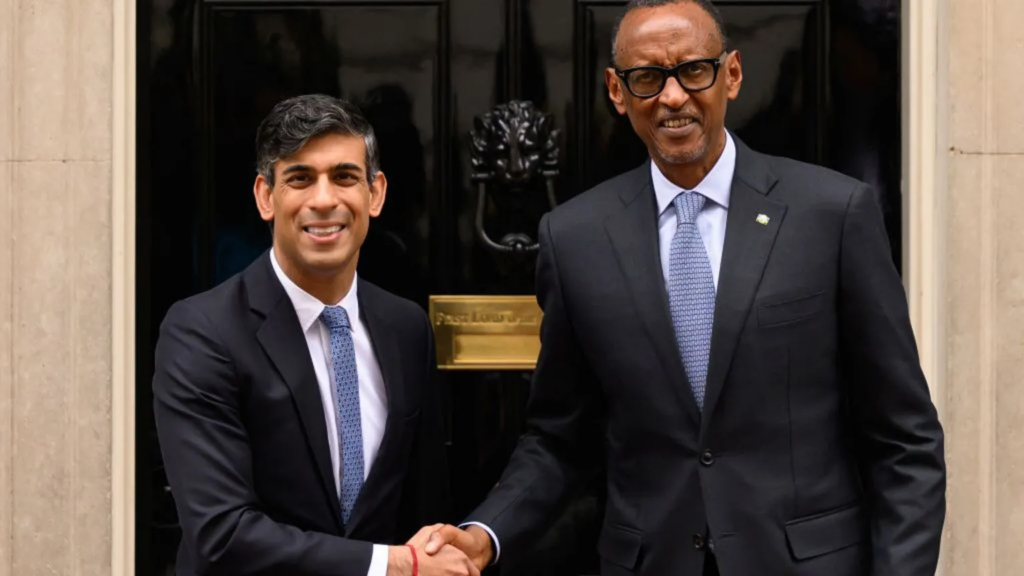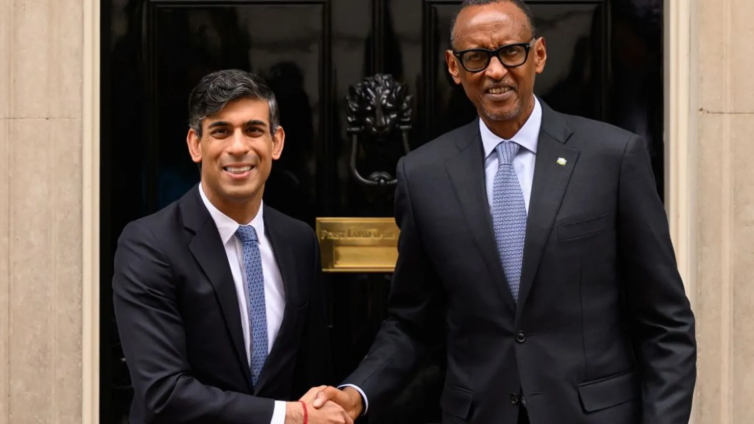Rwanda has said it is not required to refund the UK after a multi-million-pound migrant deal between the two countries was scrapped.
New UK Prime Minister and Labour Party leader Keir Starmer announced at the weekend that the plan to deport some asylum seekers to Rwanda was "dead and buried".
The scheme was forged by the previous Conservative government, which since revealing the plan in 2022 has paid Rwanda £240m ($310m).
Legal challenges meant the scheme never took off and the UK expressed hope on Monday that some money from the deal could be recouped.
The following day, a spokesperson for Rwanda's government told the country's state television: "Let this be clear, paying back the money was never part of the agreement."
Alain Mukuralinda said the agreement "did not stipulate" money should be refunded and that the UK had approached Rwanda and requested a partnership, which was "discussed extensively".

In January, after 21 months of the scheme being stalled, Rwandan President Paul Kagame suggested some money could be returned if no asylum seekers were sent to the country.
But Rwanda's government later specified there was "no obligation" to refund the UK.
In Rwanda's capital, Kigali, workers hired months ago to build housing for the asylum seekers expressed concern about Mr Starmer's decision.
The scheme’s death could “badly affect our lives”, a worker at the Gahanga site told the BBC.
Employees on the site get paid between £1.80 and £6 per day - relatively good wages for construction workers in Rwanda.

Resident Mariya Nyirahabimana said the value of houses in her neighbourhood had increased significantly since construction started, but she feared that “poverty could come back” to Gahanga.
Since his party won last week's election in a landslide, Mr Starmer has labelled the Rwanda scheme an expensive "gimmick" and pledged to instead focus on launching a new Border Security Command to tackle people-smuggling gangs.
Opposition to the bill has also came from other quarters over the past two years - the UK's Supreme Court ruled the plan unlawful, human rights organisations branded it cruel and draconian, while dissenters within the Conservative Party pushed for amendments that would better protect the scheme from legal challenges.
The previous government said the scheme was aimed at deterring people from crossing the English Channel in small boats.
Illegal migration is one of the major challenges facing the UK government.
So far this year, more than 13,000 people have crossed the Channel in small boats.
The figure is higher than numbers for the same period last year, although in 2023 as a whole there was a drop compared to 2022.
Denmark had been mulling a similar deal with Rwanda, but it put the discussions on hold in January last year.
It said it wanted a more unified approach within Europe to tackle illegal migration.
Latest Stories
-
Real Madrid leave it late to beat nine-man Savilla
49 seconds -
Alcaraz ends Sinner’s streak to win Italian Open
7 minutes -
Marijuana-infused Kings Orange Flavoured Liqueur and Jupiter 1990 are unsafe for consumption – FDA warns
15 minutes -
Internet data cost: No one has power to revise tariffs except Finance Minister – Sam George
47 minutes -
Sunday power cuts due to heavy rainstorm – ECG
1 hour -
Flooding on Pokuase–Amasaman road leaves commuters stranded
2 hours -
Prof Kwesi Yankah writes: Dollar boys in town
2 hours -
Prosecute Akonta Mining immediately – Coalition against galamsey tells government
3 hours -
2024/25 GPL: Mawuli Wayo secures maximum points for Hearts at Berekum Chelsea
3 hours -
GPL: Kwame Opoku scores twice as Asante Kotoko thrash Dreams FC
3 hours -
2024/2025 GPL: Karela United stun Medeama SC with 3-1 victory
4 hours -
Mpox cases increase to 4 – Ghana Health Service
4 hours -
2024/2025 GPL: Samartex beat Bechem Utd to go 6th
4 hours -
Curbing the global trade imbalance: The role of African nations
4 hours -
When the Colonist Sneezes: Macron’s Migraine and Africa’s Awakening
5 hours

